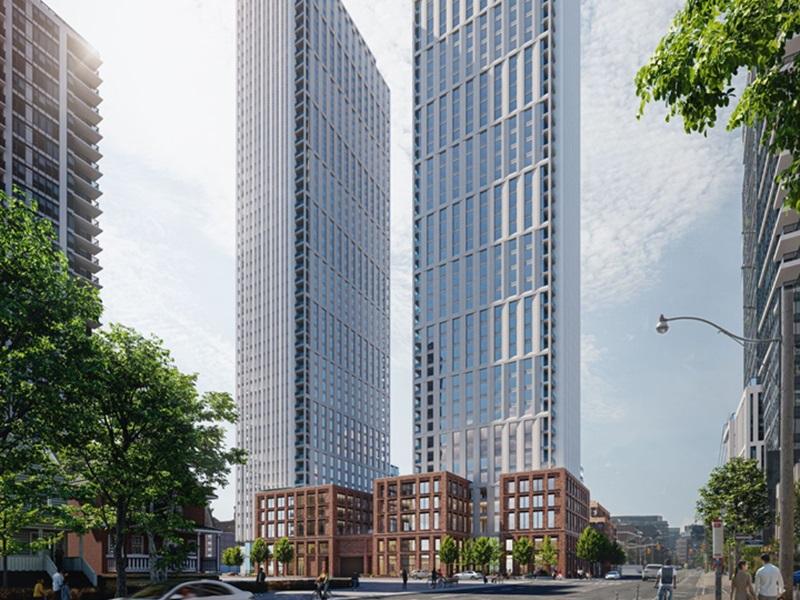
A rendering of the proposed Poplar Regional Health & Wellness Village in Collingwood, Ont. (Courtesy Live Work Learn Play)
Town council in Collingwood, Ont. has endorsed a request for a Minister’s Zoning Order (MZO) to help advance the rezoning process for the 130-acre Poplar Regional Health & Wellness Village mixed-use development.
Di Poce Management Limited (DPML) and Live Work Learn Play Inc. are proposing to use vacant industrial land in the town, located on Nottawasaga Bay about a 90-minute drive northwest of Toronto, to build the development.
The land is owned by Di Poce, who owns and operates the DPML holding and investment company and is the founding partner of Alpa Lumber Group, which employs more than 2,000 in Ontario.
Di Poce also has a strong commitment to philanthropy, including the establishment of the John Di Poce Family Transplant Fund for University Health Network, contributions to the Collingwood General & Marine Hospital Foundation, and a land donation to Georgian College to establish the John Di Poce South Georgian Bay Campus in Collingwood.
An MZO is a provincial tool used to expedite developments which support and implement government priorities.
The proposed MZO for Poplar Regional Health & Wellness Village would establish the necessary zoning to allow the development to proceed. It includes the possibility of a new hospital and facilities on a 30-acre parcel of the land, which would be gifted as a community benefit by Di Poce to the Collingwood hospital.
“His crowning glory of philanthropy and generosity is going to be this Poplar Regional Health & Wellness Village delivering state-of-the-art health care, wonderful jobs, a tremendous enduring economy and very much-needed attainable workforce housing and other community benefits,” Live Work Learn Play chief executive officer, co-managing partner and founding principal Max Reim told RENX.
Poplar Regional Health & Wellness development
It’s hoped the first phase of the project can break ground 12 to 36 months after it receives all provincial and municipal rezoning approvals. In the meantime, the development team is looking to start interim activation and place-making at the property as early as the fall of 2023.
The proposed development, along the Poplar Sideroad at Raglan Street in the rapidly growing town of close to 30,000, will be completed in phases.
“It will be very flexible and dynamic so that it can always be improving over time,” Reim said. “It’s a living, breathing organic garden of development and community development which allows for changes in uses and ideas to really drive home the concept of health, wellness and innovation.”
The first phase would include: a public square; “attainable” workforce housing; a health care institution with an adjacent wellness park; a 5.5-kilometre all-season trail system through the property hopefully connecting to an existing regional trail system; and 19 acres of protected green space that would be turned into an eco-friendly learning area and bird sanctuary.
There are also plans to enter discussions about creating a regional transportation hub.
Residential component of development
The overall development proposal calls for more than 2,200 low- and mid-rise residential units, and 1.6 million square feet of medical, health-related, office, research and innovation spaces.
The developers say their plan will help alleviate a housing affordability crisis in Collingwood that has taken people with good-paying jobs out of the homebuying market. Reim said employers are requesting agreements for the provision of attainable workforce housing for their employees.
“We’re not going to be able to solve all of the housing crisis problems, but it’s going to be a very important first step in providing some of those solutions on housing.”
The residences will make use of innovative technologies and aim to leave a low carbon footprint. Reim said they’ll also celebrate the rural and bucolic nature of the region.
“Another thing that’s very important to us and various levels of government is to create a centre of excellence for aging in place, which is purpose-built housing for an aging population from the entire region coupled with sustainable and affordable programs,” said Reim.
Health and wellness elements of project
There have been discussions and negotiations with a major health care institution, which can’t be named at this time, to be part of Poplar Regional Health & Wellness Village.
Life sciences, biotech, sports medicine, technology and innovation programs would also be a significant component. Current estimates are to develop approximately one million square feet for medical, health and wellness services and approximately 600,000 square feet of office, research and innovation space.
Poplar Regional Health & Wellness Village won’t include a shopping centre, strip mall or big box stores.
“This is about bringing in wonderful and supportive retail and restaurants necessary for this employment centre, for the healthcare institution, for the life sciences district and for all of the residents who are going to benefit from this supportive housing program,” said Reim.
The mix of uses will provide synergies and economies of scale in addition to bringing a number of benefits to the Collingwood area.
Financial analysts at KPMG conservatively estimate Poplar Regional Health & Wellness Village will deliver more than $2 billion in economic impact to Collingwood and the surrounding region, according to Reim.
Live Work Learn Play
Live Work Learn Play specializes in the envisioning and positioning, market research, programming, planning and financial modelling essential to underpin the strategic direction of a project, as well as the anchor deal-making, leasing and development execution critical to ensuring successful implementation.
The company has offices in Toronto and Montreal and has been involved with a wide variety of projects in North America and Europe. Among those it’s currently involved with are:
– reconnecting three different communities with 1.5 miles of the Allegheny River in a mixed-use environment in the Greater Pittsburgh area;
– creating a small town on 4,700 acres around Houston;
– reimagining and reactivating parts of the waterfront in Old Montreal;
– regenerating and reactivating villages in Italy;
– and working on securing 1,000 acres in Sonoma County, Calif. for a mixed-use community.
“While these are the kinds of projects that get us very excited,” Reim said, “Ontario has the most potential to deliver outstanding, responsible, thriving, fully integrated, complete community developments.”











